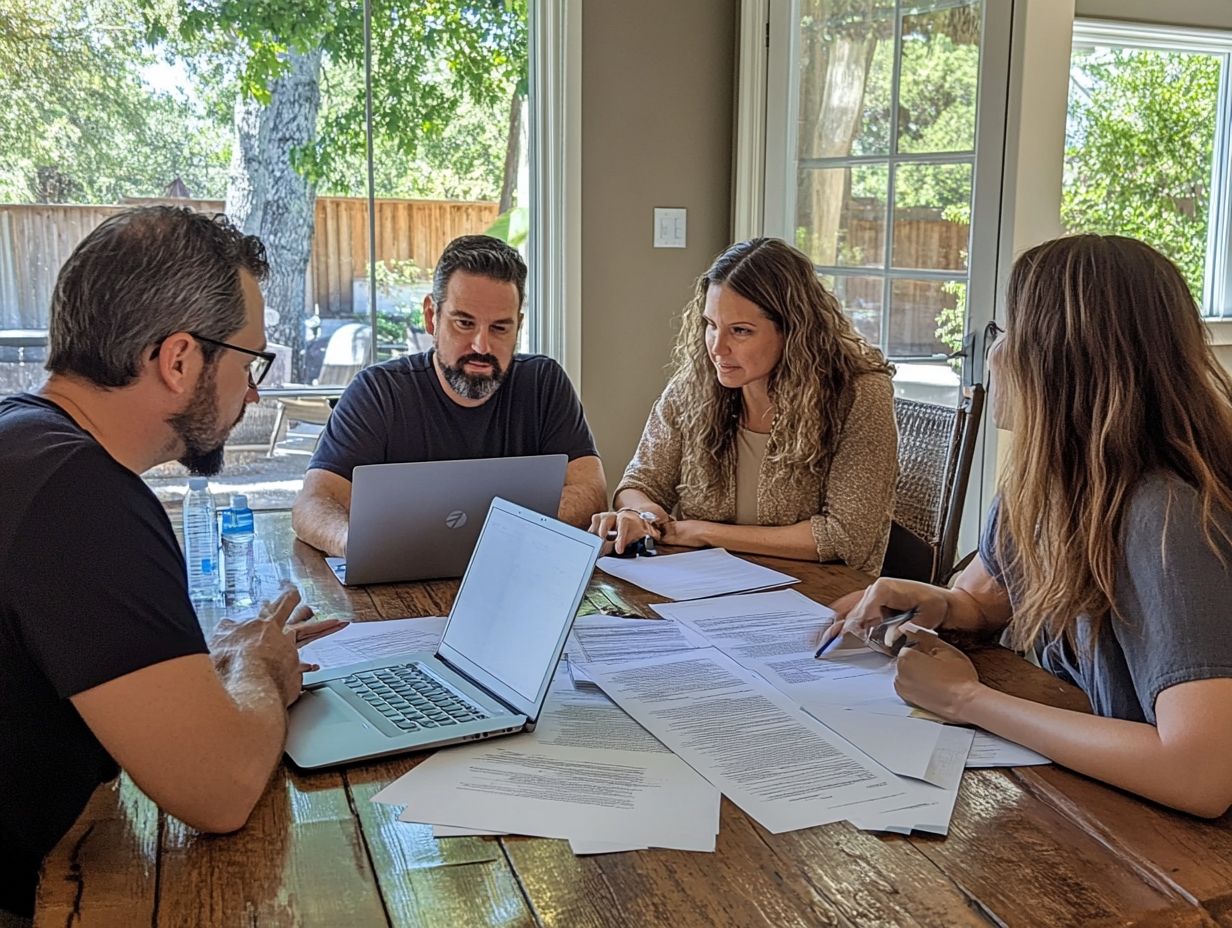The Art of Negotiating Rent: Tips for Tenants
Navigating the rental market can be tough. But don t worry! This guide will arm you with powerful strategies to secure a lease that meets your needs and budget.
Understanding the factors that influence rent prices is essential, but preparing for negotiations is just as vital. This guide will equip you with effective strategies, from researching comparable properties to highlighting your worth as a tenant.
Whether you’re up against a hesitant landlord or finalizing the agreement, these insights will empower you to negotiate with confidence and achieve success.
Contents
- Key Takeaways:
- Understanding the Rental Market
- Preparing for Negotiations
- Handling Rejection and Counteroffers
- Finalizing the Agreement
- Frequently Asked Questions
- What is the importance of negotiating rent as a tenant?
- When is the best time to negotiate rent?
- What are some tips for negotiating rent as a tenant?
- How can I research the market value of similar properties in my area?
- What are some ways to compromise with my landlord during rent negotiations?
- What are some things to avoid when negotiating rent as a tenant?
Key Takeaways:

Understand the rental market to determine a reasonable price to negotiate. Prepare for negotiations by researching comparable properties and assessing your needs.
Use strategies like effective communication and highlighting your value as a tenant to negotiate favorable lease terms.
Understanding the Rental Market
Grasping the details of the rental market is essential for both tenants and landlords.
This understanding gives you the power to navigate the complexities of rental prices, enhance tenant retention, and harness market trends to fulfill your objectives.
The rental market consists of numerous factors local demand, property management practices, and rental incentives. All of these can profoundly impact rental agreements and shape the overall tenant experience.
Factors that Affect Rent Prices
Several factors influence rent prices, including location, property condition, and local market demand. Together, these elements establish the fair market value of a rental property.
Economic conditions also play a crucial role. During economic downturns, demand for rentals may dip as individuals grapple with job insecurity, often resulting in lower monthly rent prices.
In contrast, a thriving economy typically intensifies competition for housing, driving rent prices upward.
Property maintenance costs are also important. Properties requiring significant repairs may deter potential tenants, affecting the asking price.
Tenant concerns such as safety and convenience weigh heavily on rental decisions. Research shows that neighborhoods with high crime rates often have lower rents, while access to public transportation is directly linked to increased rental values in urban areas.
Preparing for Negotiations
Preparing for negotiations is an essential step toward securing a favorable outcome in rental discussions. It gives you the power to clearly communicate your needs and expectations while gaining insight into landlord responsibilities and the nuances of market dynamics.
Researching Comparable Properties
Researching comparable properties is crucial for both tenants and landlords. It offers valuable insights into current rental prices and market trends in the area.
By leveraging online resources like Property Finder and Gulf Times, you can tap into a wealth of data. These platforms enable you to filter properties based on various criteria, simplifying the process of identifying trends in similar neighborhoods.
Engaging in thorough data analysis is key to developing a strong rental strategy. By examining average rental prices, the percentage of rented properties compared to total properties available, and seasonal fluctuations, you can negotiate with greater confidence and effectiveness.
This strategic approach sharpens your decision-making and promotes fairness in negotiations, ultimately paving the way for successful rental agreements.
Assessing Your Needs and Budget

Assessing your needs and budget is an essential step in the rental negotiation process. By doing so, you can determine exactly what you can afford while keeping in mind critical factors such as rental costs and lease terms.
Taking the time to evaluate your personal priorities like location, amenities, and the overall condition of potential properties will provide you with a clearer picture of your true housing requirements. This thoughtful approach empowers you to make informed decisions.
It also establishes a realistic framework for discussions with landlords or property managers. When you have a solid understanding of your financial boundaries and desired features, it paves the way for more productive conversations.
This clarity allows for creative solutions and alternative options that can satisfy both parties. Ultimately, aligning your expectations with market realities will lead to a much more harmonious rental experience.
Effective Negotiation Strategies
Using good negotiation strategies can help you get a better rental deal. These strategies give you the power to articulate your value while thoughtfully addressing the concerns and expectations of your landlord.
Communicating with the Landlord
Communicating effectively with your landlord is crucial to the negotiation process. It establishes the tone for your relationship and can significantly influence your success in negotiations.
Clear and respectful communication enhances mutual understanding, which is vital for addressing any concerns or expectations that may arise during your tenancy.
You should articulate your needs and issues directly, ensuring your points are well-structured and supported by relevant documentation. Gaining insight into your landlord’s obligations fosters an atmosphere of cooperation.
This understanding eases tensions and encourages productive dialogue, paving the way for prompt resolutions and a more harmonious living arrangement.
Emphasizing Your Value as a Tenant
Emphasizing your value as a tenant can significantly enhance your negotiating position. Landlords are often eager to retain responsible individuals who foster a positive rental experience.
By showcasing a strong rental history complete with timely rent payments and diligent property maintenance you can easily set yourself apart from other applicants. Highlighting your previous contributions to a community, such as involvement in tenant associations, illustrates your commitment to being a responsible tenant.
When negotiating with landlords, consider offering to sign a longer lease term or suggesting a modest rent increase in exchange for certain amenities. This demonstrates your desire to stay in the property and provides the landlord with a sense of security and stability.
Negotiating Lease Terms
Negotiating lease terms is essential for securing a rental agreement that truly benefits both parties. Get ready for engaging discussions about critical elements such as rental price, lease duration, and other vital conditions that can shape your rental experience.
Rental Price, Length, and Other Conditions

When you’re negotiating the rental price, length, and other conditions, it s important to clearly articulate your expectations while remaining open to compromise. This approach can help you achieve a rental agreement that works for both you and the landlord.
By effectively communicating your desired terms, you can foster a more productive discussion. Conduct thorough market research beforehand; understanding comparable rental rates in your area gives you the power to present a well-informed case.
Recognizing the landlord’s perspective can also facilitate a smoother negotiation process. For example, if you can commit to a longer lease in exchange for a reduced monthly rate, you may discover a solution that satisfies both parties.
Consider offering to handle minor repairs or ensuring consistent on-time payments to strengthen your position. This demonstrates to the landlord that you are reliable and bring value to the table.
Handling Rejection and Counteroffers
Stay composed and be ready to adjust your strategies to effectively address any resistance from landlords during negotiations.
Dealing with Landlord Resistance
Negotiating with landlords can be daunting. Understanding their concerns can turn the conversation into a productive exchange and open the door for potential compromises.
By employing techniques like active listening and empathy, you can create a welcoming atmosphere for dialogue. When landlords feel genuinely heard, they re more inclined to lower their defenses and engage in constructive conversation.
Present your counter offers respectfully, highlighting how proposed adjustments can benefit both parties. Framing your proposals in terms of mutual gain encourages collaboration and maintains a positive tone throughout the negotiation.
This approach helps create practical solutions and reinforces the ongoing relationship between you and your landlord.
Finalizing the Agreement
Finalizing the rental agreement marks the culmination of the negotiation process. Ensure clarity and mutual understanding in this step through a thorough review of the lease terms.
Reviewing and Signing the Lease
Reviewing and signing the lease is a pivotal moment in the rental process. You need to ensure that all terms align with your understanding from previous negotiations.
Use this chance to closely examine the document for any clauses that might appear ambiguous or unjust. Pay special attention to details such as:
- Rent payment due dates
- Maintenance responsibilities
- Policies regarding security deposits
It s also wise to clarify any rules surrounding pets, parking, or the consequences of a potential lease breach. Comparing your lease to industry standards can help you determine if it s reasonable.
If anything feels off, don t hesitate to ask questions or negotiate changes; doing so will help establish a clearer and more comfortable living situation right from the start.
Frequently Asked Questions

What is the importance of negotiating rent as a tenant?
Negotiating rent can potentially save you hundreds, if not thousands, of dollars over the course of your lease. It also allows you to establish a good relationship with your landlord and potentially secure better living conditions.
When is the best time to negotiate rent?
The best time to negotiate rent is before signing the lease. Once you have signed the lease, it becomes significantly harder to negotiate any changes to the rent or lease terms.
What are some tips for negotiating rent as a tenant?
Some tips for negotiating rent include researching the market value of similar properties in the area, pointing out any flaws in the property, and being willing to compromise with the landlord.
How can I research the market value of similar properties in my area?
You can research the market value of similar properties by checking online listings, talking to friends or neighbors in the area, and using resources such as rental price comparison websites.
What are some ways to compromise with my landlord during rent negotiations?
Some ways to compromise with your landlord include offering to sign a longer lease in exchange for a lower rent, suggesting taking on additional responsibilities such as lawn care or maintenance, or agreeing to a rent increase after a certain period of time.
What are some things to avoid when negotiating rent as a tenant?
When negotiating rent, it’s important to avoid making ultimatums, being confrontational, or making unrealistic demands. These tactics can harm your relationship with your landlord and make it harder to reach a mutually beneficial agreement.
Ready to negotiate your rent? Start with these strategies today!






